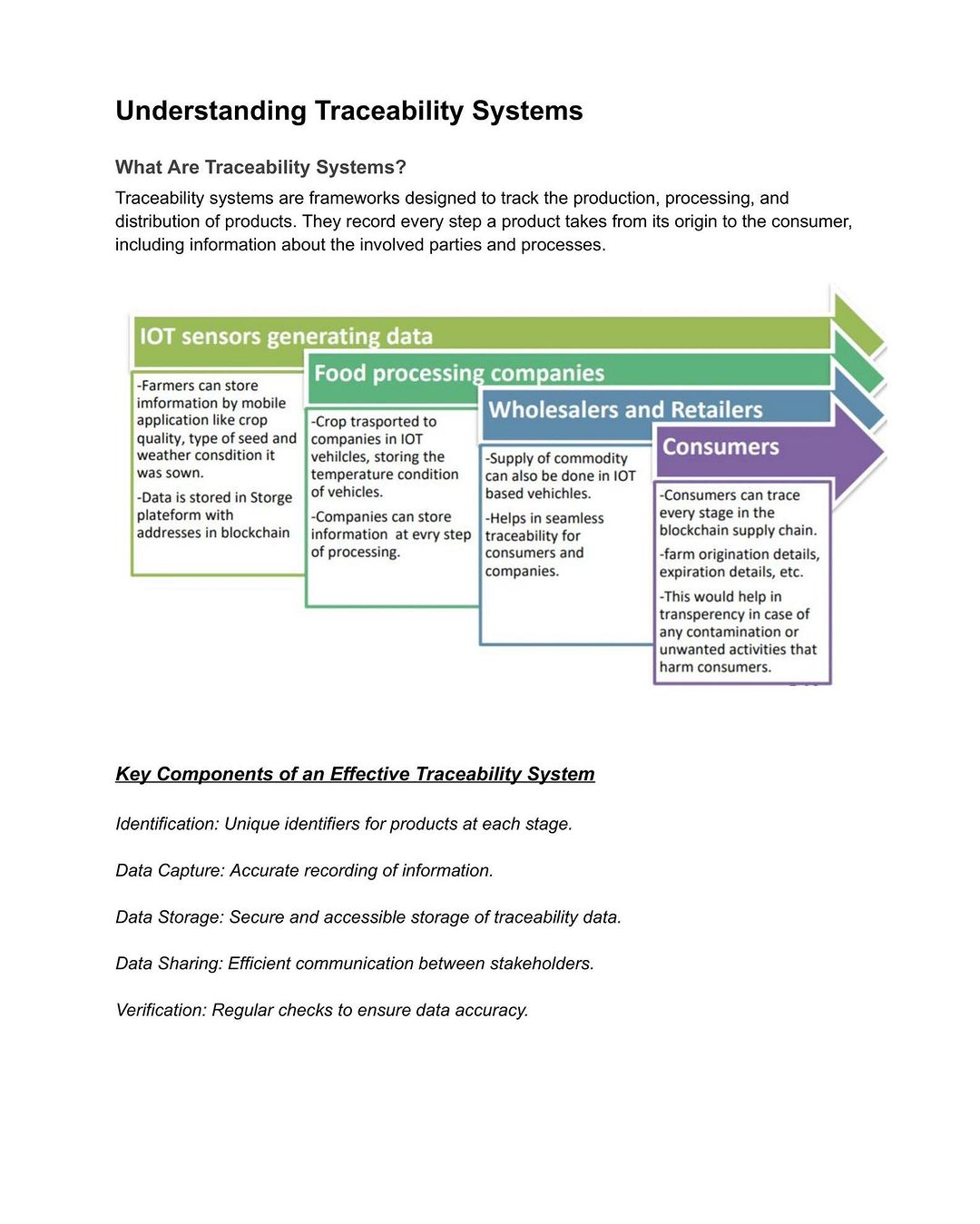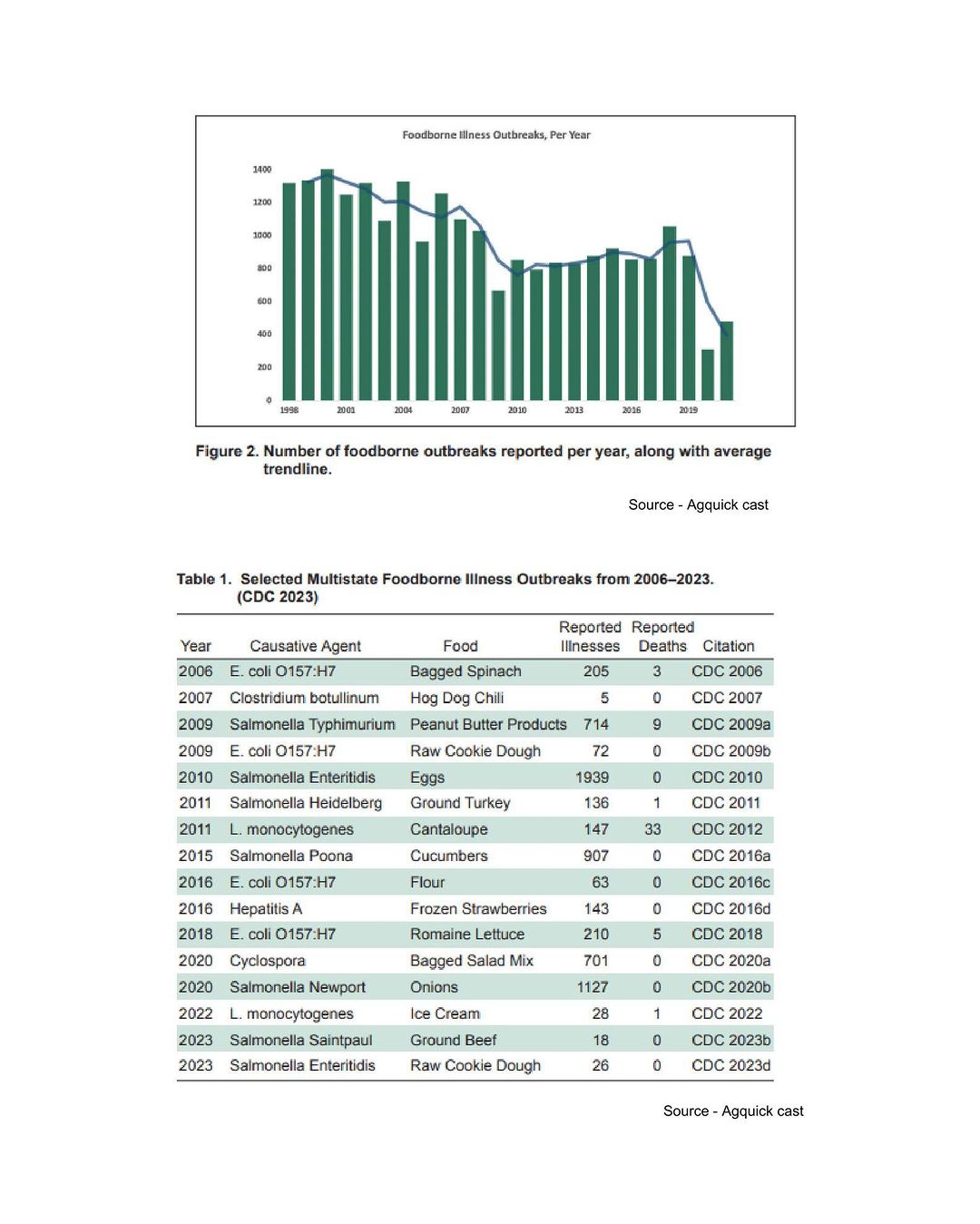
Ensuring Food Safety: The Critical Role of Standardized Traceability Systems in Agriculture
At Farmonaut, we understand that ensuring food safety isn’t just a trend; it’s our top priority. Despite the advanced agricultural capabilities in the United States, companies face significant challenges with inconsistent traceability, resulting in gaps in our food safety net. This compromises public health and trust. We believe it’s time to prioritize standardized systems for safe and reliable food.The Current State of Food Safety and Traceability
Without strong traceability measures, the threat of foodborne illnesses hangs heavily, undermining trust in our food chain. We need to equip ourselves with standardized traceability systems that efficiently address contamination risks. Let’s explore the current landscape and the urgent need for change.The Importance of Traceability in Agriculture
Traceability in agriculture refers to the ability to track the movement of food products and their ingredients through all stages of production, processing, and distribution. This process is crucial for several reasons:- Food Safety: Enables quick identification and recall of contaminated products
- Consumer Trust: Provides transparency about food origins and handling
- Supply Chain Efficiency: Improves inventory management and reduces waste
- Regulatory Compliance: Helps meet increasingly stringent food safety regulations
- Quality Control: Allows for better monitoring and improvement of food quality
Challenges in the Current U.S. Food Supply Chain
Despite being a global leader in agriculture, the United States faces several challenges in implementing effective traceability systems:- Lack of Standardization: Different companies use various traceability methods, making it difficult to share information across the supply chain
- Complexity of Supply Chains: Modern food supply chains are often long and complex, involving multiple stakeholders
- Cost Concerns: Implementing comprehensive traceability systems can be expensive, especially for smaller producers
- Technological Barriers: Not all participants in the supply chain have access to or familiarity with advanced traceability technologies
- Data Management Issues: Collecting, storing, and analyzing large amounts of traceability data can be challenging

The Consequences of Inadequate Traceability
The lack of standardized traceability systems in the U.S. food supply chain has far-reaching consequences:1. Increased Risk of Foodborne Illness Outbreaks
Without effective traceability, identifying the source of contamination during a foodborne illness outbreak becomes a time-consuming and challenging process. This delay can lead to more people falling ill and greater economic losses for the food industry.2. Economic Losses Due to Recalls
When traceability is inadequate, food recalls often need to be broader than necessary, leading to significant financial losses for producers and retailers. A standardized system would allow for more targeted recalls, minimizing economic impact.3. Eroded Consumer Confidence
Frequent food safety issues and large-scale recalls can severely damage consumer trust in the food industry. This loss of confidence can have long-lasting effects on brand loyalty and overall market stability.4. Regulatory Non-Compliance
As food safety regulations become more stringent, companies without robust traceability systems may struggle to comply, potentially facing fines or other penalties.5. Inefficient Supply Chain Management
Lack of standardization in traceability systems can lead to inefficiencies in inventory management, increased waste, and difficulties in optimizing the supply chain.The Need for Standardized Traceability Systems
To address these challenges, we at Farmonaut advocate for the implementation of standardized traceability systems across the entire food supply chain. Here’s why standardization is crucial:- Improved Interoperability: Standardized systems allow for seamless information sharing between different stakeholders in the supply chain
- Faster Response Times: In case of a food safety issue, standardized systems enable quicker identification and resolution of problems
- Cost-Effectiveness: While initial implementation may be costly, standardized systems can lead to long-term cost savings through improved efficiency and reduced recall expenses
- Enhanced Consumer Trust: Transparent, standardized traceability can boost consumer confidence in food safety
- Better Regulatory Compliance: Standardized systems make it easier for companies to meet evolving food safety regulations
Farmonaut’s Approach to Traceability
At Farmonaut, we’re leading the way in establishing standardized traceability systems. Armed with cutting-edge technology like satellite data and blockchain, we’re improving traceability and fortifying risk management in agriculture.
Our Innovative Solutions
- Satellite-Based Monitoring: We utilize satellite imagery to monitor farming practices and environmental conditions, ensuring compliance with safety standards.
- Blockchain Integration: Our blockchain technology creates transparent, immutable records for seamless farm-to-table tracking.
- IoT Sensors: We deploy IoT devices to collect real-time data on various aspects of the farming process.
- AI-Powered Analytics: Our advanced algorithms analyze data to provide actionable insights and predict potential issues.
- Mobile Applications: We offer user-friendly mobile apps for farmers and other stakeholders to easily input and access traceability data.
Benefits of Farmonaut’s Traceability System
- Real-Time Monitoring: Instant access to critical data throughout the supply chain
- Enhanced Food Safety: Quick identification and isolation of potential contamination sources
- Improved Supply Chain Efficiency: Optimized inventory management and reduced waste
- Increased Consumer Trust: Transparent information about food origins and handling
- Regulatory Compliance: Easy adherence to food safety regulations
- Cost-Effective Implementation: Scalable solutions suitable for businesses of all sizes
Comparison: Farmonaut Satellite System vs. Drone and IoT-based Farm Monitoring
| Feature | Farmonaut Satellite System | Drone-based Monitoring | IoT-based Monitoring |
|---|---|---|---|
| Coverage Area | Large scale (global) | Limited (local) | Limited (local) |
| Frequency of Data Collection | Daily | As needed (manual flights) | Continuous |
| Initial Setup Cost | Low | High | Medium to High |
| Maintenance Requirements | Minimal | High | Medium |
| Weather Dependency | Low | High | Medium |
| Data Processing Complexity | Low (automated) | High | Medium |
| Scalability | Highly scalable | Limited scalability | Moderately scalable |
Case Study: Implementing Farmonaut’s Traceability Solution
To illustrate the effectiveness of our approach, let’s look at a recent implementation of Farmonaut’s traceability solution in the honey industry.Farmonaut’s Traceability Solution for Honey with Dabur
In November 2023, Farmonaut partnered with Dabur, a leading consumer goods company, to address traceability challenges in their honey supply chain. The collaboration resulted in a customized solution that initially focused on drum-based traceability and later expanded to include Android, iOS, web, and WhatsApp platforms.Key Features of the Implementation:
- Drum-based Traceability: Unique identifiers for each drum of honey
- Multi-platform Support: Accessible through various devices and platforms
- User-friendly WhatsApp Interface: Simplified data input for beekeepers
- End-to-end Tracking: Traceability from hive to home
Results:
- Improved Supply Chain Visibility: Dabur gained comprehensive insights into their honey sourcing
- Enhanced Quality Control: Easier identification and isolation of quality issues
- Increased Consumer Trust: Ability to provide detailed provenance information to customers
- Streamlined Operations: Reduced time and effort in managing traceability data
The Future of Food Traceability
As we look to the future, several trends are likely to shape the evolution of food traceability:- Increased Regulation: Governments worldwide are likely to impose stricter traceability requirements, making standardized systems even more crucial.
- Consumer Demand for Transparency: As consumers become more conscious about food origins and safety, demand for detailed traceability information will grow.
- Integration of Emerging Technologies: Technologies like AI, machine learning, and the Internet of Things will play an increasingly important role in traceability systems.
- Global Standardization Efforts: There will likely be more initiatives to create global standards for food traceability, facilitating international trade and food safety.
- Focus on Sustainability: Traceability systems will increasingly be used to verify sustainability claims and support environmentally friendly practices.
How Farmonaut is Preparing for the Future
At Farmonaut, we’re continuously innovating to stay ahead of these trends and provide cutting-edge traceability solutions:- Investing in R&D to integrate emerging technologies into our platform
- Collaborating with regulatory bodies to ensure our systems meet and exceed future requirements
- Expanding our blockchain capabilities to provide even more secure and transparent traceability
- Developing user-friendly interfaces to make traceability data more accessible to consumers
- Focusing on scalable solutions that can adapt to changing industry needs
Call to Action: Join the Traceability Revolution
The time for standardized traceability systems in our food supply chain is now. We invite farmers, food processors, retailers, and consumers to join us in this crucial endeavor. Here’s how you can get involved:- For Farmers: Explore our farm management and traceability solutions. Visit our app redirect page to get started.
- For Developers: Integrate our API into your systems. Check out our API documentation.
- For Mobile Users: Download our app from the Google Play Store or the Apple App Store.
- For Weather Data Enthusiasts: Explore our Satellite Weather API.
Subscribe to Farmonaut
Ready to transform your farming practices with cutting-edge satellite technology? Subscribe to Farmonaut today and unlock the full potential of your farm:
Frequently Asked Questions (FAQ)
1. What is food traceability?
Food traceability is the ability to track the movement of food products and their ingredients through all stages of production, processing, and distribution. It allows for the identification of the origin of food ingredients and the path they take through the supply chain.2. Why is standardized traceability important in the food industry?
Standardized traceability is crucial because it ensures consistency across the supply chain, enables quick identification of issues, facilitates efficient recalls, and builds consumer trust. It also helps companies comply with regulations and improve overall food safety.3. How does Farmonaut’s traceability system work?
Farmonaut’s system uses a combination of satellite imagery, blockchain technology, IoT sensors, and AI analytics to monitor and track agricultural products from farm to table. This comprehensive approach ensures accurate, real-time traceability throughout the supply chain.4. Can small farms benefit from Farmonaut’s traceability solutions?
Yes, Farmonaut offers scalable solutions suitable for farms of all sizes. Our system is designed to be cost-effective and user-friendly, making it accessible to small-scale farmers as well as large agricultural operations.5. How does blockchain technology enhance food traceability?
Blockchain creates an immutable, transparent record of all transactions and movements in the supply chain. This ensures data integrity, prevents fraud, and allows for instant verification of product origins and handling.6. What are the main challenges in implementing traceability systems?
Common challenges include high initial costs, resistance to change, technological barriers, data management issues, and the complexity of integrating systems across diverse stakeholders in the supply chain.7. How can consumers benefit from improved food traceability?
Consumers benefit through increased food safety, access to more detailed information about their food’s origins, and greater confidence in the products they purchase. Traceability also supports ethical and sustainable food choices.8. Is Farmonaut’s system compliant with food safety regulations?
Yes, our system is designed to meet and exceed current food safety regulations. We continuously update our platform to ensure compliance with evolving regulatory requirements.9. How does Farmonaut’s satellite-based system compare to traditional monitoring methods?
Satellite-based monitoring offers wider coverage, more frequent data collection, and lower maintenance requirements compared to traditional methods like drone or ground-based monitoring. It’s also less affected by weather conditions and more cost-effective at scale.10. Can Farmonaut’s traceability system integrate with existing farm management software?
Yes, our system is designed to be interoperable with various farm management software. We offer APIs and integration support to ensure seamless connectivity with existing systems. In conclusion, standardized traceability systems are not just a technological advancement; they are a necessity for ensuring the safety and integrity of our food supply chain. At Farmonaut, we’re committed to leading this transformation, providing innovative solutions that make traceability accessible, efficient, and effective for all stakeholders in the agricultural sector. By embracing these technologies and working together, we can create a safer, more transparent food system for everyone.
In conclusion, standardized traceability systems are not just a technological advancement; they are a necessity for ensuring the safety and integrity of our food supply chain. At Farmonaut, we’re committed to leading this transformation, providing innovative solutions that make traceability accessible, efficient, and effective for all stakeholders in the agricultural sector. By embracing these technologies and working together, we can create a safer, more transparent food system for everyone. 